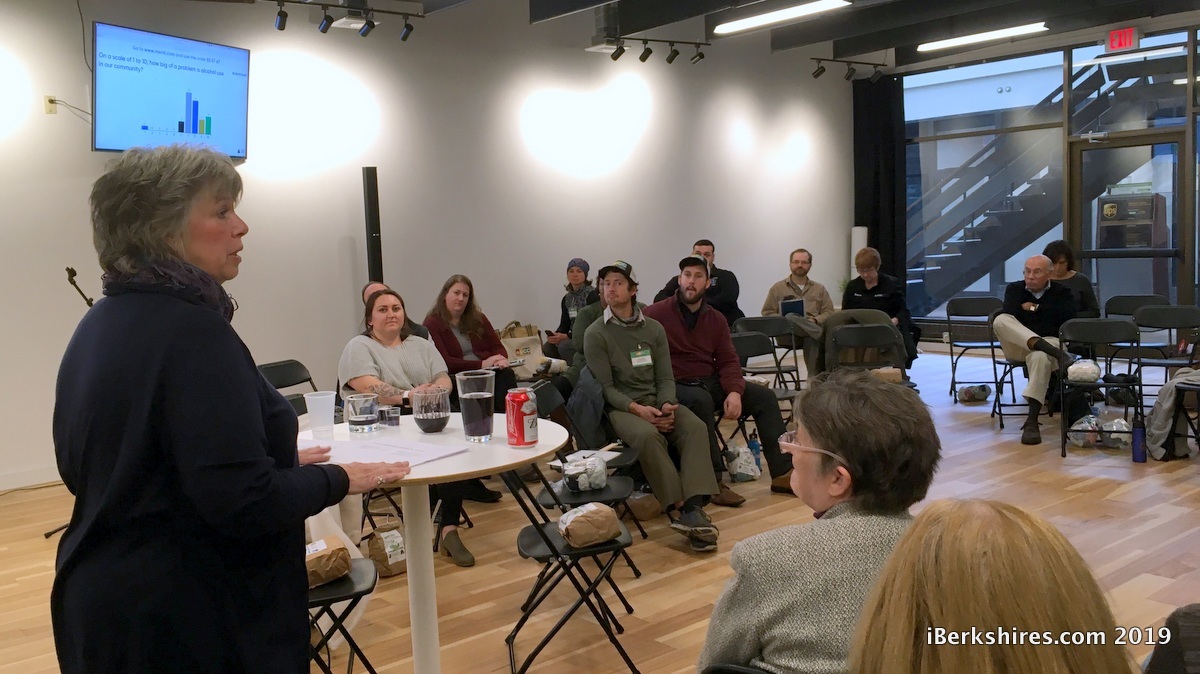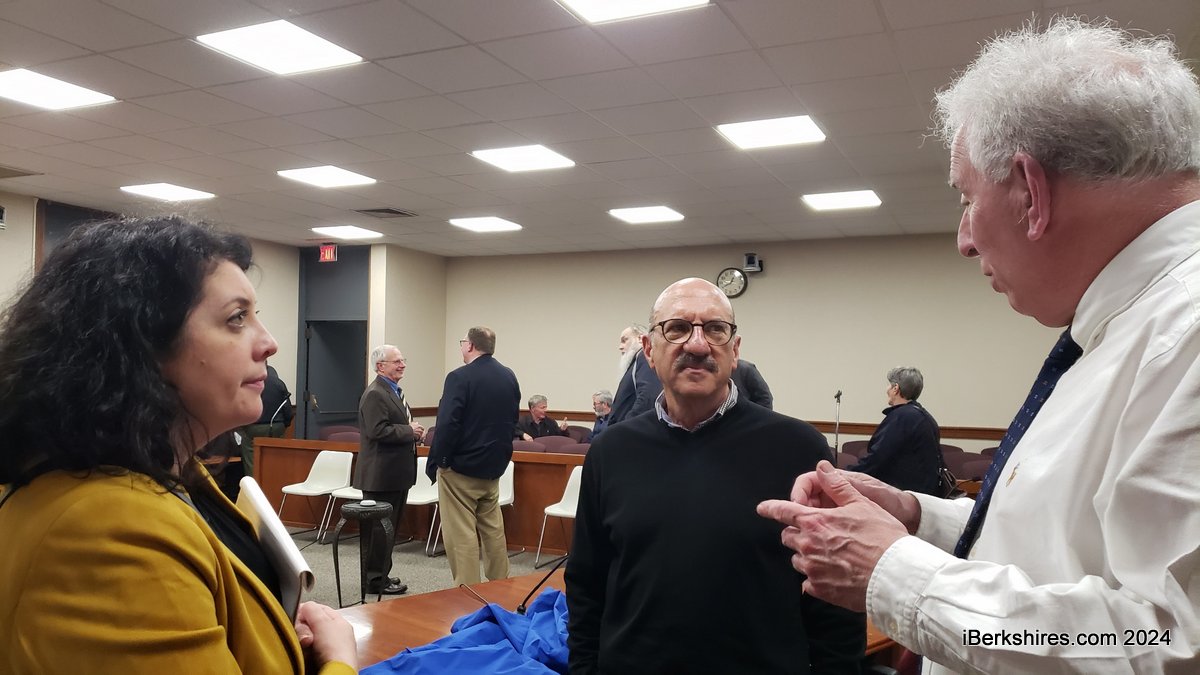
Coalition Tackles Vaping, Alcohol Use in Community

NORTH ADAMS, Mass. — As the Northern Berkshire Community Coalition was discussing the issue of vaping in the community at its forum on Friday morning, the Centers for Disease Control was releasing information about what officials suspect is causing illness and death among those who vape.
The announcement that vitamin E acetate, an oily chemical added to some THC vaping liquids to thicken or dilute them, is being investigated as a possible culprit into the outbreak that has sickened more than 2,000 people across the country and killed at least 39 is welcome news, of course. But vaping remains an "invisible crisis" in North Berkshire, along with the misuse of alcohol, according to Wendy Penner, the Coalition's director of Prevention and Wellness.
"This is just an exciting and important conversation," Penner said. "We know that vaping and alcohol use by adults is a critical issue in our community."
Addressing the issue of vaping was Joyce Brewer, the TFPC program manager from Berkshire AHEC, who gave an overview of vaping for those 50 or so participants at the forum. Vaping products have really only been in existence internationally since 2006, and only in the United States since 2008 or 2009. And it's only since about 2015 that Juul -- the small, technologically advanced e-cigarettes -- became widely commercially available and now accounts for 75 percent of the market.
"Juul was the iPhone of the e-cigarette," she said.
Immediately the company started selling "youth-oriented flavors" with marketing campaigns that appealed to youths that did not have to follow the same advertising regulations as cigarettes. Vaping products are easy to buy, easy to conceal and are cheaper than regular cigarettes. That was concerning to public health officials who had been seeing a downward trend in cigarette use by youths, and who also know the statistic that those who remain smoke free through the age of 25 are less likely to ever pick up the habit.
Now, the CDC and public health officials are trying to get out the message that vaping devices still contain nicotine and are still addictive and harmful to one's health -- particularly in light of the illnesses and deaths recently reported. And people like Brewer want to make sure local residents know that quitting is possible and they can reach out to their doctors, hotlines like 1-800-QUIT-NOW and even places like the Beacon Recovery Community Center for help and support.
"So often people are made to feel like failures when they quit," said Brewer, who as a former smoker knows first-hand that it can take multiple attempts for a smoker to quit. "It's one of the hardest things people will ever do.
"The journey's not easy. But there are a lot of people out there willing to help."
The second half of Friday's forum focused on the use and misuse of alcohol in the community -- which was a different kind of conversation, mostly because alcohol use is more widely accepted. In fact, when the forum participants were asked to rate how problematic alcohol use is in the Northern Berkshire community on a scale of 1 to 10, only a handful said 10, while one person said one.
That doesn't jibe with what Stephen Murray with Northern Berkshire EMS sees in his job, he shared with the group. While a lot of attention is focused on the opioid epidemic, Murray said he sees alcohol-related calls "pretty much every shift," while the same is not true for opioid-related calls.
"It's the drunk people I have a harder time dealing with," said Murray, who said he has been in the homes of some of the most rich and powerful people in our area on alcohol-related calls and has been assaulted by drunk people in the course of doing his job. "We like to laugh it off because it's a socially acceptable thing to do.
"We need to self-reflect on our use."
That use, locally, is higher than state and national averages, said Susan Cross, the coalition's Prevention and Recovery program associate, who gave a visual presentation highlighting different amount of alcohol in different kinds of drinks and shared slides from the "Rethinking Drinking" publication about alcohol use in general and specifically the issue of binge drinking.
Cross also shared a personal story related about the dangers of the misuse of alcohol: Her stepson faces significant prison time after being accused of setting her home on fire and leading police on a chase throughout Berkshire County, something she attributed to unresolved mental health and alcoholism issues.
"That's what binge drinking does," she said.
And it's often harder to see the problem of alcohol abuse in relation to illegal drug abuse because it often takes a "continued high risk exposure" for damage to be done, according to registered nurse Barb Reeves, a peer leader at the Beacon Recovery Community Center.
"These deaths don't happen quickly. They happen very slowly," she said.
Murray also attested to that, saying he sees the opioid crisis manifesting itself in younger people an alcohol dependence in those in their 30s and older.
"It takes longer to bring you to your knees. By the time it gets to you, you are already having trouble," he said. "There's a lot of things to think about when it comes to alcohol. In this community, it's bad.
"I'm one of those people who said '10,'" he said.
Coalition Executive Director Amber Besaw said she believes that can be attributed to the pervasiveness of alcohol at community events, including situations like candidate forums and election celebrations that are held in a bar, something she heard many comments on in the aftermath of the recent North Adams election, and even "bring your own beer" parties celebrating a young child's birthday.
"[We need an] awareness of how much it's embedded," she said, adding the she was hoping this forum can begin the process of "starting a dialogue."
Penner agreed as she closed the forum, musing that perhaps the county's "Heroin Work Group" should be renamed an "Addiction Work Group" to address all forums of substance use and abuse.
"We really want to continue this conversation," she said.
Tags: alcoholism, NBCC, vaping,
















